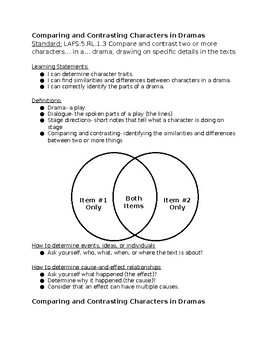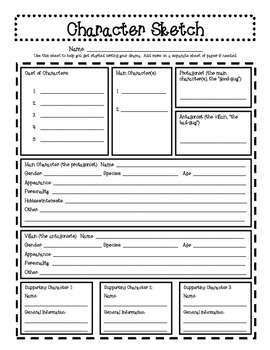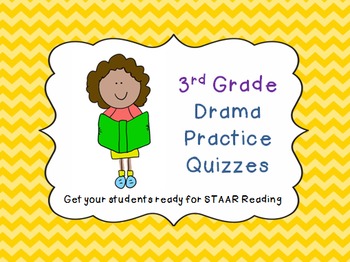Authors: National Governors Association Center for Best Practices, Council of Chief State School Officers
8th Grade Midterm Exam for Nonfiction Article of the Week Club, Article #8-13: Man Vs. Nature in the Amazon RainforestThis midterm exam/midterm assessment for 8th grade reading informational text is completely editable (in PPT) so you can customize it for your students or simply print and go. English Language Arts Standards » Writing » Grade 4 » 9 » a Print this page. Apply grade 4 Reading standards to literature (e.g., “Describe in depth a character, setting, or event in a story or drama, drawing on specific details in the text e.g., a character’s thoughts, words, or actions.”). Grade Checks are expected every Thursday to determine eligibility for the following Friday. Students must have grades above a 'C' a 'D' results in 2 weeks to get your grade up to a 'C'; failure to do so results in leaving the club. A 'F' results in being out of the club for the quarter. Students cannot miss more than 3 days Sports are excused.
Title: CCSS.ELA-Literacy.RL.5.2 Determine A Theme Of A Story, Drama, Or Poem From... Reading:Literature - 5th Grade English Language Arts Common Core State Standards

Publisher: National Governors Association Center for Best Practices, Council of Chief State School Officers, Washington D.C.
Copyright Date: 2010
(Page last edited 10/08/2017)
- A Detailed Speech Outline - If you base your speech on this outline you should be able to make a successful speech, or if you use the outline to look at a speech someone else gave, you can critique more effectively
- Incredible Shrinking Notes - Lesson plan on how to summarize what is heard
- On Writing a Paper - Article suggesting on how to write a complicated thesis; outline suggestion given along with tips
- Quoting, Paraphrasing, and Summarizing - Defines each and then tells why and how to use each
- Scaling Back to Essentials: Scaffolding Summarization With Fishbone Mapping - Complete fishbone maps that highlight the main ideas and relevant details from a cause-effect text; lesson plan [from the Internet Archive]
- Thesis Statement - A thesis takes a stand rather than announcing a subject [from LEO]
- Tips and Examples for Writing Thesis Statements - From the OWL at Purdue
SpringBoard’s English Language Arts offers a full curriculum with a flexible framework so you can use its units and resources as needed.
Why It Helps
Beginning in grade 6, SpringBoard English Language Arts students develop and refine skills in critical thinking, close reading, writing in various genres, and doing research.

Over the course of the program, they read and analyze a wide range of texts in genres including poetry, novels, plays, biographies, nonfiction narratives, speeches, and films. They also learn to write in forms including essays, personal narratives, argumentative texts such as editorials, and research papers.
How It Works
Each grade level uses complex, grade appropriate texts that allow students to examine an idea from multiple points of view while working with a variety of genres. Students progress from guided reading through collaborative projects to confident, independent work.
Grade 6
In units built around the theme “Change,” students will:
- Read work by Langston Hughes, John Steinbeck, and Sandra Cisneros
- Write narrative, explanatory, and argumentative texts
- Learn strategies for planning, drafting, revising, and editing their own writing
- Explore the fundamentals of research, including citations and how to evaluate the credibility of sources
- Deepen their understanding of topics through film and multimedia
Grade 7
In units built around the theme “Choice,” students will:
- Read work by Nelson Mandela, Robert Frost, Sojourner Truth, and Shakespeare
- Learn close reading strategies to discover the explicit and implicit content of texts
- Write in argumentative, explanatory, and narrative modes
- Examine how ideas are conveyed in film and multimedia
8th Grade Ela Books
Grade 8
In units built around the theme “Challenges,” students will:
- Read work by Ray Bradbury and Walt Whitman, an essay about Civil War heroes, narratives about the Holocaust, and Elie Wiesel’s Nobel Prize acceptance speech
- Learn about the hero archetype and hero’s journey narratives
- Write narrative, explanatory, argumentative, and other texts
- Research an issue in current events and then create a multimedia presentation
- Read scenes from Shakespeare’s A Midsummer Night’s Dream, then watch the scenes on film and analyze how the adaptation differs from the source
Grade 9
In units that examine the uses of language, students will:
- Read works by authors such as Margaret Atwood, Louise Erdrich, William Shakespeare, Joshua Bennett, Toni Morrison, as well as selected nonfiction
- Learn to gather evidence from texts and incorporate it into written and oral responses
- Write in argumentative, informational, narrative, and other modes
- Research and present findings around a current issue
Grade 10
In units that study the power of language to persuade, students will:
- Read works such as Chinua Achebe’s Things Fall Apart, Sophocles’ Antigone, Susan B. Anthony’s “On Women’s Right to Vote,” and Kofi Annan’s Nobel Prize acceptance speech
- Examine how culture influences worldview
- Incorporate textual evidence into a written argument
- Write in argumentative, narrative, information, and other modes
- Research a culture and present findings in a collaborative presentation using digital media
Grade 11
In units built around the theme “The American Dream,” students will:
- Read foundational documents such as the Declaration of Independence and Lincoln’s Second Inaugural Address, essays by Henry David Thoreau and Ralph Waldo Emerson, and Zora Neale Hurston’s novel Their Eyes Were Watching God
- Write an expository essay defining what it means to be an American
- Write a synthesis essay arguing whether or not America still provides access to the American Dream
- Write in a variety of modes and genres
- Compare print and film versions of Arthur Miller’s play The Crucible
- Create a news outlet based on real-world news organizations
Grade 12
Drama Club8th Grade Ela Page 18

In units built around the theme “Perspective,” students will:
8th Grade Ela Curriculum
- Read works such as James Baldwin’s “Stranger in the Village,” George Orwell’s “Shooting an Elephant,” Shakespeare’s Othello, and George Bernard Shaw’s Pygmalion
- Apply multiple perspectives to complex texts
- Apply various types of literary criticism: archetypal, Marxist, feminist, historical, cultural, and reader response
- Perform rigorous reading and writing that synthesizes learning
- Analyze how historical contexts have influenced performances of Othello, and compare multiple film versions of the drama
